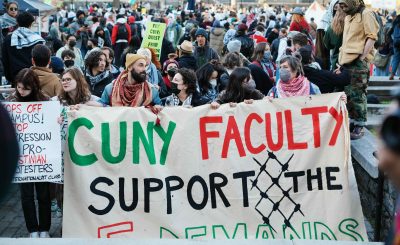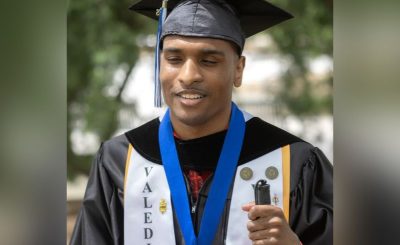By: Angelina Sitara Iadanza. Temple Grandin, an animal science professor at Colorado State University and a prominent speaker and writer on autism, once said, “I strongly recommend that students with autism get involved with special interest clubs in some of the areas they naturally excel at. Being with people who share your interests makes socializing easier.”
Why did Temple Grandin say this? Many students with autism often isolate themselves from people they might not know and need lots of support to improve their social skills and reduce anxiety talking to people about their common interests. Additionally, counseling can be a great therapy to help individuals with autism improve their communication skills and lessen their stress.
Grandin, who is herself autistic, did not classify autism as a disability; she classified it as her superpower because it makes her unique in every way.
World Autism Awareness Day is celebrated on April 2nd. In addition, Autism Awareness Month is celebrated every year in April. It often uses the phrase “different, not less” to encourage individuals with autism to accept their differences from others. Blue is the main color used to bring awareness and encourage understanding and acceptance of individuals with autism with the phrase, “Light It Up Blue”.
Cheyenne Murray, a current student at Queensborough Community College who is graduating next month, had been told she wouldn’t graduate from high school or make it to college as an individual with autism. “I would use my autism as a motivation to push through and prove people wrong,” she said.
Victoria Santos, who is another current student at QCC, who is in her second semester, believes that autism means a difference in thinking, which is different from the mainstream.
“It [autism] is also a thing that can cause a lot of difficulties in one’s life, and you know, if people don’t understand it enough, then people can be make vague judgments about their journey with autism that are inaccurate,” Santos says.
Santos also uses her autism as a superpower, but sometimes she doesn’t because, she says, in certain areas, she can’t. “Autism gives me a lot of advantages and strengths and a lot of different areas, including special interests and just trying to understand people different from me better. I think in a lot of ways, it also provides me with a lot of disadvantages, especially with difficulty socializing and difficulty in things that a person who does not have autism would struggle with in their daily lives.”
What is autism spectrum disorder?
Autism spectrum disorder is a developmental disability caused by differences in the brain. It also affects the way people interact with one another, communicate, learn, and behave in their lives. Boys are four times more likely to develop autism than girls due to biological differences that girls experience.
The symptoms of autism include avoiding eye contact, engaging in repetitive behaviors, intense focus on special interests, and inability to adapt to changes in routines or new situations. There is no specific cause of autism, yet there are risk factors in developing autism such as having older parents, having a sibling with autism, low birth weight, and other genetic conditions such as Down syndrome or Fragile X syndrome.
Individuals also tend to show signs of autism before being diagnosed with it at around three years of age. If children do not meet the standards (e.g., reaching for objects at four months), then they need to be placed in an early intervention program for evaluation. Evaluations must also be done to know what areas of improvement those individuals need to work on in terms of behavior, motor skills, and emotional regulation. They can take place at home, school, or really any place.
Autism & coexisting conditions
Autism co-exists with other conditions such as ADHD (Attentive-Deficit/Hyperactivity Disorder), anxiety, and depression. According to the statistics of students with autism who also have ADHD from National Institute Mental Health, about 50-70% of students with autism also have ADHD due to similar symptoms between them such as being talkative rather than being aware of what their peers say in a conversation. In other words, autism and ADHD both have a range of symptoms including difficulty concentrating, irritability, and difficulty controlling impulses, in common.
It is also very common for individuals with autism to experience high levels of anxiety due to uncomfortable situations, meeting new people, experiencing trauma, and feeling overwhelmed with how much work they need to complete. According to statistics from Neurodivergent
Insights, around 42-79% of individuals on the spectrum have anxiety among different ages, with 49% of them being diagnosed with an anxiety disorder. People with autism could have depression; they are four times more likely to develop depression compared to those who are neurotypical.
People with autism experience anxiety and depression due to a wide variety of challenging factors including unfamiliar social circumstances, physical symptoms they could experience, and the way they think of themselves. Individuals with autism who have high levels of anxiety could be experiencing panic attacks/episodes due to school stressors, rainy weather, thoughts about events that did not even happen, sense of doom, tightness of the chest area, and people who make them feel inadequate.
Strengths & challenges
Every person with autism has different strengths and deficits in their daily lives. For example, Murray loves art as one of her strengths.
“My strength is drawing because that was the only way I could communicate with others, especially due to the fact that I had trouble making friends and knowing how to fit in.” However, she has experienced challenges with sensory and communication skills. “Loud noises would bother me in public places along with clothing texture.”
Santos is open to learning and trying new things. “My strengths are being interested in new things and being willing to explore new ideas and being able to understand others.” Typically, individuals with autism have strengths in mathematics, science, music, and art. However, Santos is strong at her writing skills. “I can do math well, not exceptionally well; I haven’t done well in math over the course of my years in school. I’d say a strength of mine is writing because I am capable of understanding stories no matter the genre.”
Why join the CCSD club?
The CUNY Coalition for Students with Disabilities, or “CCSD club,” is an engaging club to join and meets in the Medical Arts Building in Room 134 every Wednesday from 12-2 P.M.
This club is open to all students, not just students with disabilities. Its purpose is to
“provide awareness to the campus community issues that impact students with disabilities”. This club can also improve an individuals’ social skills and mental health, in particular if they’ve been stressed about their schoolwork.
Leonard Blades, who is a Disability Accommodation Specialist in the Office of Accessibility Services located in Room 132 of the Science building , has run this program, yet this club has been occurring even before he began working at Queensborough Community College for over a decade. Blades explains how the CCSD club brings an awareness of neurodiversity.
“April is CUNY’s Disability Awareness Month at Queensborough Community College. We always make an effort to bring programming that brings awareness to students with disabilities. We are also having an workshop on how to be an ally to students with students and demonstrate inclusivity towards our neurodiverse community on April 9th during club hours.”
He also states ways that the CCSD club ensures fairness, equality, diversity, and many other aspects. “The first thing that we do at the beginning of each academic year is to make sure students understand what the values are of this club, and it’s a lot of what you really cover in terms of diversity, acceptance, and more.” Based on Blades, the CCSD club is a judgment free zone because students need to understand that this is a safe space and to be sure they are aware that they can come to this space; the CCSD club is not a classroom nor is it mandatory.
Students with disabilities and without disabilities can benefit from joining a club like the CCSD in many ways. In addition, they have increased their socialization skills in terms of getting to know each other more, and they always enjoy actively participating in games like the Family Feud one that happened in one of the club meetings a couple of months ago. To sum it up, the CCSD club is one of the most welcoming clubs to join because you are never alone, and you will always have someone to talk to.
One Queensborough student from the OAS, Shayne Moore, described the CCSD club as if it was a family because he shares that we are all in this together no matter what time our classes being or what types of stressors we experience due to college burnout or feeling easily overwhelmed about course overload in our classes. Being a part of the CCSD club can benefit its members by reducing anxiety, spreading positivity, and increasing confidence without feeling judged about appearances.
New York Families for Autistic Children
NYFAC stands for New York Families for Autistic Children, and it was launched by five families out of a small house in Queens in 1999. They have been passionate about supporting families and our neurodiverse community for over 20 years.
The main purpose of this organization is to “facilitate growth, independence, and empower people with developmental disabilities and their families to lead full lives.” Most importantly, this organization has increased their population to over 100 people who support children and adults with autism and other developmental disabilities, and offer a range of individualized .
Advice for neurodivergent individuals
Students with autism have learned multiple ways to overcome adversity no matter what challenges they face. Murray and Santos both gave advice to other students with autism and other disabilities to never feel ashamed of being different. They also advised them to be themselves; in other words, students with disabilities should not try to fit in and compare themselves to others because everyone is different in a unique way no matter what they do.
“If someone tries to judge you for who you are, don’t listen to them. Only listen to people who are where you want to be. You should trust yourself in your own thoughts and you own feelings, and you should know that you matter, and you deserve happiness and joy.”
Spreading happiness towards individuals with disabilities is a crucial way to show awareness. Studies show that it is common for individuals on the spectrum to struggle with their mental health due to overwhelming circumstances, and they may need guidance to help them through life without being biased or making assumptions towards them. The more caring a person is towards individuals with disabilities, the more support they will receive in their lives no matter where they go.



